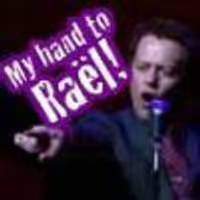"Watching" Theatre vs. "Seeing" Theatre
#1"Watching" Theatre vs. "Seeing" Theatre
Posted: 9/24/15 at 12:55pm
This is as semantical and potentially as meaningless as a post on this board gets, but I feel the need to see if others share my perspective on this.
It bothers me to no end when people say they are going to "watch" Wicked or that they "watched" Hamilton. Maybe it's just me, but qualifying your attendance at a theatrical event as "watching" just sounds so wrong. I've used "seeing" and "see" for as long as I can remember.
To me, "watching" suggests there to be a barrier between audience member/viewer and performer. That's why you "watch" TV and movies—the screen is the barrier.
"Seeing" connotes being immersed in an experience—and that is the very purpose of the stage.
I'm already anticipating the "shut up" comments on this thread, but was wondering if others share my view on this non-issue.
neonlightsxo
Broadway Legend Joined: 7/29/08
#2"Watching" Theatre vs. "Seeing" Theatre
Posted: 9/24/15 at 12:58pmI agree with you. "Seeing" is correct and "watching" is wrong. I see this mistake made a lot with people whose first language is not English.
#3"Watching" Theatre vs. "Seeing" Theatre
Posted: 9/24/15 at 1:00pm
I totally agree. If someone says they "watched" Rent or Les Miz (examples of musicals that have made it to another adaptation), I'll assume they meant the film/cinecast/concert. If someone says they "saw" it, I'll assume they attended a live production.
Phyllis Rogers Stone
Broadway Legend Joined: 9/16/07
#4Watching vs Seeing
Posted: 9/24/15 at 1:02pm
I feel that way about movies. When someone says they are seeing a movie, I assume they are seeing it at a cinema. If they say they are watching a movie, I assume they mean at home. I know that's not always the case, but that's how my brain interprets it.
#5Watching vs Seeing
Posted: 9/24/15 at 1:07pm
I agree that "seeing" is much better than "watching", which totally sounds like a movie or TV.
But in all honesty, usually I wouldn't say "I saw The King and I yesterday". I would say "Yesterday I went to The King and I". And friends often ask me "what shows have you gone to recently?" rather than "what have you seen recently". I'm not sure it's a clear or significant difference, but GOING to theatre is the idea for me, not merely "seeing" it.
#6Watching vs Seeing
Posted: 9/24/15 at 1:16pm
I agree but at the same time I often say that I'm going to "see" a movie if I'm going to the cinema rather than saying "watch" but if it's a movie on tv it feels appropriate to say "watch."
#7Watching vs Seeing
Posted: 9/24/15 at 1:52pm
I'm fairly certain I only actually use the term "see" (or similar form) and can't honestly remember anyone I know using WATCHED....but I'm not sure it would have stuck out to me as something horrid.
(But probably will now forever be etched in my head.
#8Watching vs Seeing
Posted: 9/24/15 at 2:04pm
I agree that "seeing" would be correct for any theatrical experience. Movies are a little different, though; I've always noticed that when someone says they "saw" or "are seeing" a movie, that means it's their first time watching it, regardless of whether it's at the movies, at home, at a friend's house, etc. Any other time after that would just be "watching" the movie. (Unless they're strictly speaking of going to the cinema, in which case I've always heard people just say "seeing" even if they've already seen the movie in theaters before.)
Phantom4ever
Broadway Legend Joined: 9/17/07
#9Watching vs Seeing
Posted: 9/24/15 at 2:18pm
I never hear it with theater, but I often hear people, especially older people (70+) say "look at" when it comes to television and movies.
#10Watching vs Seeing
Posted: 9/24/15 at 2:22pm
BroadwayConcierge said: "To me, "watching" suggests there to be a barrier between audience member/viewer and performer."
There is: their phone!
#11Watching vs Seeing
Posted: 9/24/15 at 3:24pm
You're right that it's just semantics - it's a linguistic shift. In even older times, people would talk about going to "hear" a play, which could even be construed as a dig against the standing crowd who would have to rely on the dumb show that preceded the action to understand the plot when the dialogue became too complex for them. I'm sure there was many a snooty conversation held around a candle-lit dinner table about youngsters having "seen" a play; "why, in my day, one went to the theater to listen!"
neonlightsxo
Broadway Legend Joined: 7/29/08
#12Watching vs Seeing
Posted: 9/24/15 at 3:37pm
I love that this entire thread is a subtweet of this thread:
https://forum.broadwayworld.com/readmessage.php?thread=1086938&dt=3
Updated On: 9/24/15 at 03:37 PM
#13Watching vs Seeing
Posted: 9/24/15 at 7:00pm
I agree with CATSNY, if you are leaving the house, you go to see something. If you're staying in, you're watching it.
#14Watching vs Seeing
Posted: 9/24/15 at 7:56pm
I agree with the original post. I feel like "see" is more active. You're actively involved in the performance or the film. It's more attentive. Watching definitely seems more passive.
#15Watching vs Seeing
Posted: 9/24/15 at 8:18pm
It's not really a question of active versus passive. "I saw a man" is more passive than "I watched a man." It is, as others have said, merely a question of usage. You go out to see something and stay in to watch something. That's why it weirds me out when people ask me if I've "watched" a movie that's still in theaters. Actually, now that I think about it, it's weird no matter how old the movie is. "Have you watched Casablanca?" doesn't sound right, either.
Basically, TV shows are "watched" no matter what. Theater is "seen" no matter what. Movies, on the other hand, depend on the context. Movies in theaters are "seen," movies at home are "watched" in the simple past tense (I watched Casablanca) and "seen" in the present perfect tense (I have seen Casablanca).
#16Watching vs Seeing
Posted: 9/25/15 at 2:32am
It may be semantics, but I completely agree with you. And it goes beyond theater I think, like I watch the Giants play on TV every night, but on Tuesday I'm going to see them play. It feels like it shouldn't matter, but it really does make a difference. I've never even talked about going to the movies as watching, when I actually go to the theater, I'm going to see this movie. I think of watching when it's on a tv or computer screen I guess.
#17Watching vs Seeing
Posted: 9/25/15 at 11:31am
Oh, totally. (Re: sports.)
I've not only noticed this with people for whom English is a second language, but people whose parents don't speak English well or all, or people who are new to theatre. Let's teach!
EDIT: Oh, one other occurrence. I've had usher friends say "I watched the show until..." (I had to go home/I had to help an elderly audience member/etc). But in this case, it also makes sense, because they're not going to a show and seeing it like we are; they're working, and are watching.
neonlightsxo
Broadway Legend Joined: 7/29/08
Videos










